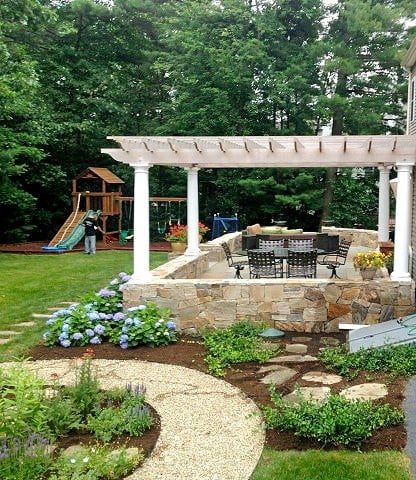
Your garden is a reflection of your personality as well as the personality of your home, and it can be quite challenging to find a professional landscaper who can take your personality and translate it into an outdoor area that you will love. A good professional landscaper will take your needs into account, but will also ensure that the landscape works in terms of choosing the right plants for your area, having buildings placed sensibly and ensuring that the garden is as easy to maintain as possible. Finding the right designer for you can be quite tricky, so here are a few tips that will help you make your decision.
Tip #1: Choose the right person for the job
When looking for a person to help you with your landscape design, you will run into a number of terms, and it’s important to know what the differences between the various job descriptions entail.
- Landscape architects have usually been formally trained and hold advanced degrees. In a large number of states, they have to be licensed and may not practice without this license. Landscape architects are comfortable with advanced construction designs such as drainage systems, retaining walls and outdoor structures, and will oversee a project from start to finish.
- Professional landscapers are usually not licensed, but they may have the same training as licensed landscape architects. They have a more horticultural background compared to landscape architects and will be a good fit for you if you want a garden without any complex structural elements such as retaining walls or drainage systems. Even if they don’t have a state license, most professional landscapers are registered with an association of designers.
- Landscape contractors are the people who will carry out the design of the project and install the plants, irrigation, construction elements and any other design features. Your professional landscaper or architect will generally have a team of certified contractors who they will hire to carry out their designs.
Regardless of whether you choose to go with a professional landscaper or architect, make sure that you check their certifications and ensure that they are registered with the relevant associations or boards and that they will be able to meet your needs. Most professional firms will meet with you to discuss the project free of charge, and will only charge you a design fee once they have stated interest in your project.
Tip #2: Set project goals
Knowing what type of work you want and the reason for doing it will help you set project goals and clarify your needs. Are you looking to reduce your water usage, or make a play area for your children? Do you simply want to raise the land value of your home? Knowing these will help your contractor identify any possible problem and give them an overall goal to work towards.
Tip #3: Know your budget before you start
A budget sets the scope of the project and also gives the designer a good idea of how much they can do in terms of the design. It can be intimidating if you don’t know what things cost, but having an honest figure that the contractor has to adhere to means that there won’t be any complications further down the line. A good designer will discuss the spending range with which you’re comfortable, and will also discuss what your priorities are as well as the quality of the materials you expect. The contractor will then use this information to give a budget estimate which will factor in aspects such as existing vegetation, design features, the quality of the materials to be used, the side and state of the terrain as well as the project size.
Tip #4: Examine the track record
Apart from making sure that your contractor is certified and registered with any relevant boards or associations, you can check their ratings and reviews, particularly if you found them via the internet. Review sites like Yelp and Angie’s List can offer candid reviews, but be aware that people will always choose to complain and never to compliment. However, a lot of negative reviews can be a good indicator to move on and carry on looking. Also ask the contractor for references as well as examples of previous work. References may provide hints to any weaknesses of the contractor, such as going over budget or going over time that portfolios will not reveal. Most landscape design firms will have a portfolio available on their website, which will provide a good indication of whether the professional landscaper had designs that match your personal aesthetics and if they are a good fit for your needs.
Tip #5: Ask how sub-contracting will be handled
While most landscape firms will have dedicated teams of contractors that they work with and trust, thye may sometimes need to call in the specialized services of somebody else. You must be comfortable not only with the professional landscaper, but also their sub-contractors. Ideally, keep the entire project under the domain of one contractor to ensure that progress is smooth and that the project moves along the estimated pace. If your professional landscaper is planning on using a sub-contractor, make sure they use only insured companies that they have worked with before.
Tip #6: Make sure you have a contract
One you’ve decided on the designer that you want, make sure that you sign a comprehensive contract that details every step of the project. This should include:
- The payment schedule, which will detail the deposit, each payment installation and the final payment when the project is completed. Tie the payments to project milestones instead of dates, which will help prevent the project from running over budget and over time.
- The start and projected completion dates. There is an inherent leeway to the completion date, but good contractors will make sure that they don’t run months over schedule.
- The materials and products to be used in the project
- Proof of liability insurance and worker’s compensation payments
- A provision that the contractor has to obtain lien licenses from all suppliers and sub-contractors, which means that you are not liable for paying his bills and protect your from mechanic’s liens.
Most landscaping firms will have their own contract templates that they use, but if you find that they’re not detailed enough and don’t cover all of the aspects above, don’t hesitate to draw up your own or add addendums to theirs. Having a clear contract isn’t about trust, it’s about ensuring that the project is successful and that everybody understands what is required of them at all times, resulting in a successful landscaping project.
Conclusion
Finding a good professional landscaper is the same as for finding a good contractor for any other type of job. Firstly, make sure that both you and they understand the project and your needs, and that they are able to meet these requirements. Most reputable contractors will be registered and will gladly give you references from prior projects. Checking their track record will ensure that they are reputable and that they can deliver on time and on budget. Having a solid contract will ensure that all parties know what’s required of them and what the expectations for the project are and how the project will be conducted.




